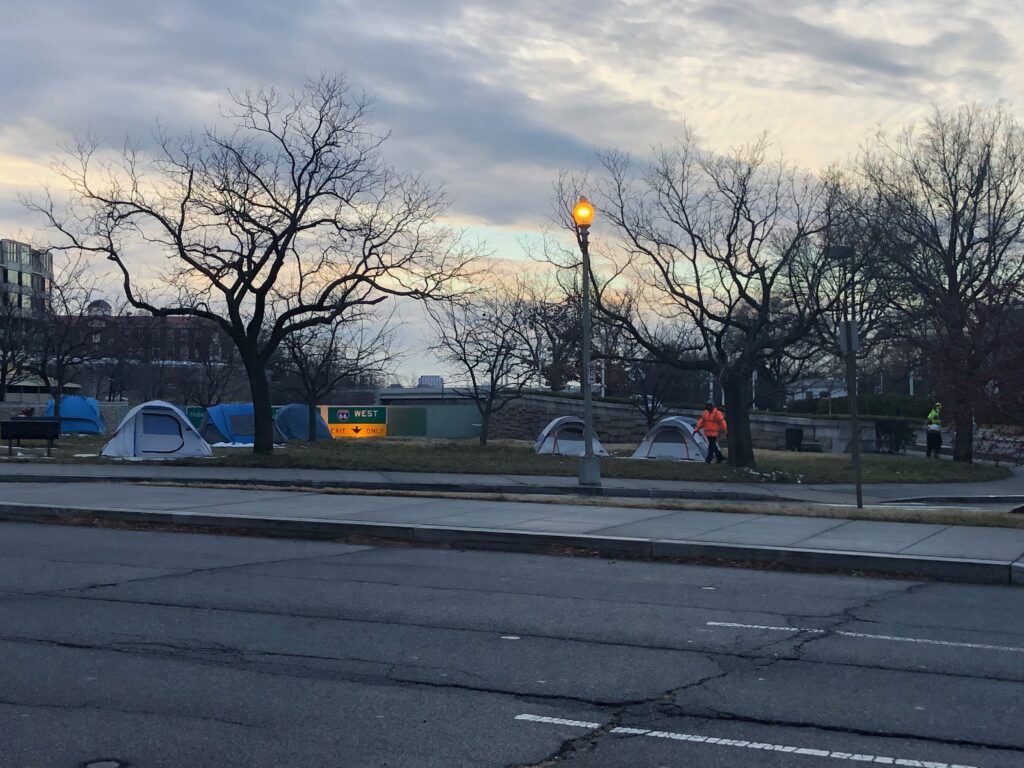Precautionary measures to stop the spread of COVID-19, such as virtual worship services and limited indoor dining, have hurt the homeless community’s ability to find hot food and a warm place to escape D.C.’s largest snowfall in two years.
Community spread of the coronavirus has surged in 2021, with a daily case rate of 30.9 per 100,000 residents through the week of Jan. 27 and hospitals at more than 90% capacity.
Many churches and restaurants that offered free hot meals to food-insecure residents at the beginning of the pandemic are no longer able to do so and as a result some have begun offering bagged lunches instead.
However, several social services have adjusted their distribution model to keep a consistent supply of hot meals.
Miriam’s Kitchen in Foggy Bottom has been able to keep hot meal services going uninterrupted since the beginning of the pandemic. Instead of having guests indoors, they’ve set up their kitchen in an outdoor courtyard under tents. The organization uses high-quality hot meals to build relationships and engage people in social services, said Deputy Director Adam Rocap. “We still have most of the services we would have had indoors during our mealtimes,” he said, “like helping people access their stimulus checks, helping people connect with housing assessments or housing options, and other benefits.”
Outside of Miriam’s Kitchen, Darryl Green, an individual experiencing homelessness, said that many of the places he used to go for hot meals are closed. Miriam’s Kitchen and Charlie’s Place are the best organizations offering hot meals downtown, said C-Money D Greatest. Both men expressed frustration over the lack of access to public restrooms and indoor spaces to stay warm during the pandemic.
Rocap said Miriam’s Kitchen has been concerned about those issues too. Miriam’s Kitchen has made restrooms available in an outdoor trailer on weekdays from 6:30 a.m. to 5:30 p.m. “We did a lot trying to help the city and advocate for the city to open up a daytime warming center that’s at the downtown services center location that we’re really excited about,” Rocap added.
View this post on Instagram
However, other organizations have not been able to offer these services due to health concerns.
Christy Harris, an administrative clerk at the Salvation Army Sherman Avenue Corps, said they have stopped allowing people to use the restrooms inside. “It’s a thing we have to do to protect ourselves as well as others,” Harris said. “It’s not something that we want to do, but it’s part of our procedure here.”
Similarly, Charlie’s Place, based in Saint Margaret’s Episcopal Church in Kalorama, has largely prohibited clients from using indoor facilities, although they occasionally let people use the bathroom and wash clothes. They’ve also struggled to maintain hot meal service with limited volunteers available to prepare and serve food to their clients.
This past summer, Charlie’s Place formed partnerships with Wawa and Starbucks and has continued an ongoing relationship with the Moby Dick chain restaurant to help serve individually packaged meals once a month, said Marie Graves, director of external affairs. In addition, every Tuesday from April to June, volunteers took food to Franklin Park and Dupont Circle to “start filling in the gaps” in meal distribution while the area’s larger organizations adjusted their operations to limitations imposed by the pandemic. “Being a smaller organization makes us more nimble and able to creatively provide food,” Graves said.
However, without its usual number of volunteers, Charlie’s Place has been unable to consistently serve hot meals, and the lack of access to indoor facilities have impeded their sense of community.
“I’ll be thrilled to allow guests to come in and take a nap and socialize” when the church reopens indoor services, Graves said. “We know people, we miss people, we have funerals for people. The fellowship and friendships are missed.”
Collected by Ben Gutman and Monique Wilson








